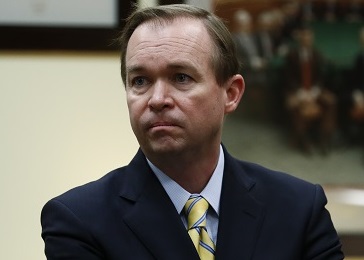If Congress passes tax reform that includes cuts to 401(k) deductions in the code, President Trump will consider vetoing the bill, according to Mick Mulvaney, director of the Office of Management and Budget.
Speaking at a symposium at Georgetown University on Wednesday, Mulvaney reiterated that President Trump and the White House have two requirements of any tax bill: that it cut the corporate tax rate, and cut taxes on the middle class.

Removing or lowering the deductibility of 401(k) contributions would amount to a “huge” tax increase on the middle class, and “would violate one of our two principles,” Mulvaney (photo, right) said.
"I can't imagine that the House and Senate would actually do something that would dramatically increase taxes on the middle class but if they did we would certainly give serious thought to vetoing it," added Mulvaney.
Tax writers in the House are reportedly considering capping the deductions on traditional 401(k) plans at $2,400, according to media reports last week. Contributions above that threshold would be made on a Roth, or after-tax basis.
That idea provoked a stern rebuke from President Trump on twitter: “There will be NO change to your 401(k). This has always been a great and popular middle class tax break that works, and it stays!”
Mulvaney said he did not know how lawmakers on the House Ways and Means Committee arrived at the $2,400 figure.
But despite the President’s pledge, Rep. Kevin Brady, R-TX, chair of the Ways and Means Committee, publically confirmed after the tweet that the deductibility of 401(k) contributions was still on the table.
“We want Americans to save more, and save earlier in their life, and earlier in their incomes,” Brady said at a conference hosted by the Securities Industry and Financial Markets Association.
“At the end of the day, we are taking a fresh look at savings plans and savings vehicles,” he added.
Brady confirmed to BenefitsPRO that the creation of new Universal Savings Accounts is also being considered. Those accounts would allow all Americans to invest after-tax money up to an annual limit that could grow tax-free. Deductions could be made anytime, for any purpose, without a penalty.
Brady would not say whether those accounts would be used to justify lower caps on 401(k) deferrals.
Mulvaney said that any bill passed by Congress will have to satisfy two basic “pillars” established by President Trump: lower corporate rates, and lower and simpler taxes for the middle class.
“At the end of the process we will look at the final product through that prism,” said the OMB director. “If that’s the case we will support it.”
Reducing the amount of pre-tax dollars invested in 401(k)s, which hold more than $5 trillion in assets, would allow lawmakers to bring revenue the government expects to collect when the assets are withdrawn and taxed in retirement into the 10-year budget window.
That would help offset revenue losses from lower corporate and individual tax rates. The White House wants the corporate rate lowered from 35 percent to 20 percent, and individual rates lowered to zero, 12 percent, 25 percent, and 35 percent.
But critics of the plan argue that using 401(k)s to pay for tax cuts amounts to a budget gimmick that would end up deterring workers from saving for retirement at a time when the country is often characterized as suffering a retirement crisis.
It has met vast pushback from the financial services industry, employers, and consumer advocates. Lawmakers in both parties and in both chambers of Congress have also voiced significant resistance.
Indeed, supporters of the idea are hard to find. Some economists have argued over the years that 401(k)s benefit wealthier Americans that don’t need tax incentives to save for retirement. Those voices have been largely silent on the eve of tax reform.
But one prominent Democrat has expressed support for limiting 401(k) deductions.
“How many working Americans can afford to put $18,000 in their 401(k) accts per year?” wrote David Axelrod, President Obama’s former chief of staff, on twitter.
“Seems like very few. Why NOT cap it at a lower number?” he added.
New studies from the Employment Benefits Research Institute and the Bipartisan Policy Center exploring the impact of limiting 401(k) deductions, or 'Rothifying' the country’s retirement system, are expected in the coming weeks. EBRI’s study will examine the potential impact on workers’ saving habits, and BPC’s study will examine the long-term impact on the federal budget.
According to EBRI, even lower income workers stand to be impacted by a $2,400 cap on contributions to traditional 401(k)s. Nearly 40 percent of workers who save in a 401(k) plan and make between $10,000 and $25,000 contribute above the $2,400 threshold, according to EBRI’s data.
House Republicans are expected to release the first version of the tax bill on November 1. The Ways and Means Committee will begin debating the bill the week of November 6.
© 2025 ALM Global, LLC, All Rights Reserved. Request academic re-use from www.copyright.com. All other uses, submit a request to [email protected]. For more information visit Asset & Logo Licensing.








